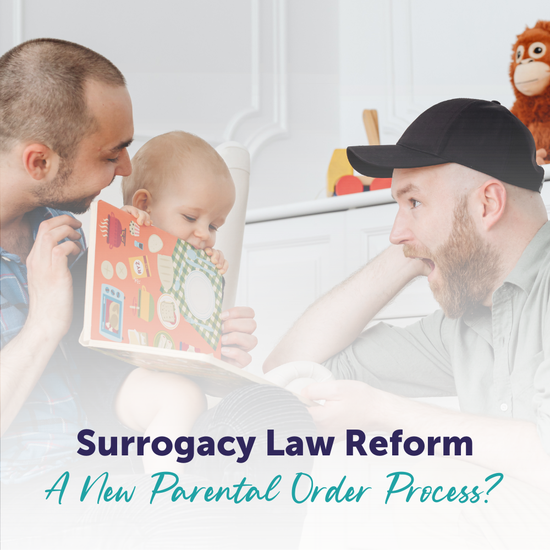
For many, becoming a parent is one of the greatest moments of their lives. At Manchester Fertility, one of the UK's first fertility clinics, we understand this better than most. For many of our patients, fertility treatment is their only chance to create the family they dream of. It is natural for those on their fertility journey to need advice and support as they navigate the process.
And although the road to starting a family has peaks and troughs for all those who walk it, this is especially true for those who require surrogacy treatment.
This year in honour of National Surrogacy Week, which takes place from the 1st to the 7th of August, we want to do our part as My Surrogacy Journey's Centre of Excellence for the North and Midlands in destigmatising the surrogacy process to support the intended parents and surrogates we work with daily. In our handy guide, learn more about surrogacy, such as what it is, the process, who might need it and how you can show your support for the community this National Surrogacy Week.
What is Surrogacy?
With surrogacy being a hot topic in the media, there are bound to be many curious people who have never even considered surrogacy before wanting to learn more about the process. There are two widely offered types of surrogacies:
Full Surrogacy, also known as Gestational Surrogacy, is when the eggs from an intended parent or a donor are used to make embryos for the surrogacy treatment. There is, therefore, no genetic connection between the baby and the surrogate.
Partial Surrogacy, or Traditional Surrogacy, involves an egg from the chosen surrogate being fertilised using sperm from an intended parent of the baby. In this case, the surrogate and your baby would have a genetic connection.
In most cases of surrogacy, eggs are fertilised in a laboratory using sperm to create embryos. The highest quality embryo will be transferred to the surrogate to carry the pregnancy to term. At Manchester Fertility, we can also facilitate intrauterine insemination (IUI) treatment for intended parents who opt for traditional surrogacy.
Who Might Need Surrogacy?
With advancements in reproductive medicine, surrogacy is becoming an increasingly accessible fertility treatment for those who otherwise could not carry a pregnancy. This includes same-sex male couples, many queer or transgender people, those who may have experienced recurrent pregnancy loss or failed IVF cycles and those who may be unable to conceive due to medical treatment, such as chemotherapy, to start their families.
At Manchester Fertility, surrogacy is available to everyone, regardless of gender, relationship status or sexual orientation. We believe surrogacy with the right balance of compassion, medical advice, and legal guidance can be a straightforward and fulfilling process. Our patients may choose surrogacy if:
- They are in a male same-sex relationship where neither partner can carry a pregnancy to term
- Neither themselves nor a potential partner can carry a pregnancy to term for psychological or emotional reasons
- Neither themselves, as a single person, nor a potential partner in a relationship can carry a pregnancy to term for medical reasons
Is Surrogacy Legal?
Surrogacy has been legal in the UK since the 1980s, with the Surrogacy Arrangements Act 1985 establishing the legal and ethical parameters of surrogacy and how fertility clinics were to deliver the service. Although there have been changes to the law since that time, such as an update that allowed same-sex couples and single parents to gain access to surrogacy services, it is apparent to all those who are part of the surrogacy community that a new process is needed, to encourage vital change and create a system that works more effectively for children, surrogates and intended parents.
2023 has already been a landmark year for surrogacy within the UK, with the Law Commission of England and Wales and the Law Commission of Scotland publishing proposals for legal reform that hopefully encourage this change. The proposed modifications intend to create a new pathway to benefit those directly affected by surrogacy.
In the new process, intended parents can become their child's legal parents at birth. They are resolving the need for the complex and often stressful process of applying for a parental order through the courts. Learn more about the draft bill, potential updates to the parental order process and the Surrogacy Law Reform on our blog.
Are Surrogates Paid in the UK?
Despite how surrogacy has become more accepted in the past few decades, there are still some misconceptions about the legalities of the process. One widespread misconception that still exists today is that surrogates get paid for their gift.
This is not true, as intended parents are not allowed to provide financial compensation for their surrogates within the UK. This means surrogacy is altruistic, and many surrogates choose to help someone else create their family out of the goodness of their hearts and help those who otherwise would not be able to have a child.
More About Surrogacy Treatment at Manchester Fertility
As My Surrogacy Journey's Centre of Excellence for the Northwest and Midlands, we're incredibly proud of our support to intended parents as they navigate the journey to parenthood. Not only do we offer a tailored surrogacy service delivered by our specialist team, including dedicated Surrogacy Co-ordinator Olivia Tindall, but we genuinely care about your journey – as shown through our ongoing partnership with TwoDadsUK®, a specialist independent surrogacy support organisation established in 2017 and the minds behind My Surrogacy Journey® - a leading UK non-profit surrogacy organisation providing professional, practical and emotional support for everyone on a journey through surrogacy.
If you'd like more information, visit our surrogacy treatment page, or if you need any advice for starting your surrogacy journey, contact our dedicated team on 0161 300 2730 today.
Get Involved this National Surrogacy Week
National Surrogacy Week was founded in 2019 by the UK surrogacy community as an independent resource to raise awareness, educate the public and celebrate good practice. National Surrogacy Week grows yearly, providing helpful information from various professionals to keep the public updated on the latest news.
Last updated: 1st August 2023






